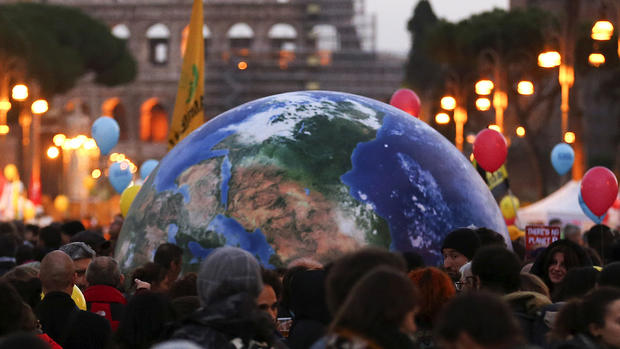Why the Paris climate change talks could flop
Suppose the gathering of world leaders at the Paris climate change conference fails to reach a consensus? Or the meeting, which concludes next week, does forge an agreement but it proves ineffective?
The fear, warned Cambridge University researcher David MacKay in an interview with German broadcaster Deutsche Welle, is that a toothless pact would mean that many countries will end up doing nothing. To some, the talks are a last-gasp attempt to craft a coordinated global approach to reducing greenhouse gas emissions. The European Union's climate chief, Manuel Canete, warned in an interview with Britain's The Guardian that no "Plan B" exists if the talks falter.
While an official air of optimism pervades the Paris event, a workable plan to head off global warming could founder for several reasons:
The GOP scotches any U.S. climate pledges. President Barack Obama, who went to Paris to lend gravity to the conclave, is foursquare behind achieving an international framework to curb global warming. The U.S. is the world's No. 2 greenhouse gas producer, following China.
Trouble is, for him, that the Republican-controlled Congress is dedicated to thwarting any treaty or any funding addressing what many in the GOP think is a hoax. And should Republicans win the White House next year, Obama's plans may well end up in the dumper. The House of Representatives this week voted to block his administration's proposed new limits on carbon dioxide emissions from power plants. (The president aims to veto the measure.)
Fearful that carbon restrictions will hamper the economy, American lawmakers in the past have thwarted climate-control efforts. The 1997 Kyoto Protocol mandated a reduction in emissions. But the Senate voted 95-0 to condemn the treaty, and President Bill Clinton gave up on getting it ratified.
Developing world reluctance. Under this scenario, the poorer nations will ignore any Paris accord because they need to grow economically, and the easiest way to do that involves burning fossil fuels. India, which heavily depends on coal-fired electricity generation, is reluctant to consent to an emissions cap by a certain date, as the U.S., which has pledged to do so by 2025, and China (2030) have done.
Meanwhile, efforts to help developing nations foot the bill are underwhelming. In 2009, industrialized countries agreed to raise $100 billion by 2020 for a Green Climate Fund to benefit emerging economies. This kitty would subsidize clean-energy technologies and other methods to curb global warming. Thus far, the fundraising is behind schedule with U.S. foot-dragging a big factor, thanks to Republican bids to hold down spending on it. Republicans say the money will only go into corrupt officials' pockets.
China will not meet any emissions goals. In the past, China has undermined climate negotiations. Generating a quarter of the world's carbon dioxide output, it did not want to crimp its pell-mell growth. President Xi Jinping, however, lately has promised to reduce emissions in 15 years and is boosting solar power and natural gas, which burns cleaner than other carbon-based energy sources.
Can the Chinese leader be trusted? Republican presidential hopeful Donald Trump doesn't think so, saying that Beijing is "laughing at us because China doesn't obey any of these rules." While you can write that off as typical Trump bluster, he may have a point.
The Chinese economy has slowed down from its double-digit pace. And although Xi's government surely wishes to reduce the horrible smog in its big cities, would it want to do that at the expense of its economy? The U.S. Energy Information Administration concluded recently that China's coal consumption was 14 percent higher over the past decade. Although the data show emissions dipped 2 percent last year, the finding underscores how unreliable official Chinese statistics can be and raises questions about how readily the nation can lower its carbon production.
Non-governmental endeavors are falling short. Certainly, private enterprise is key to any climate palliative.Many companies around the globe are working to limit their greenhouse gas outlays, but still have a long way to go. CDP Worldwide, an organization dedicated to fighting climate change, reports that 71 percent of corporations in its survey are using energy efficiency standards, up from 61 percent in 2011. Nevertheless, it admits, this is not enough to restrain emissions from increasing.
Pope Francis said Monday that the Paris climate conference was the world's last chance to avert environmental catastrophe. Otherwise, he said, humanity is "at the limits of suicide." Whether that comes true or not, expecting a world-changing pact coming out of Paris might just be a lot to ask.
